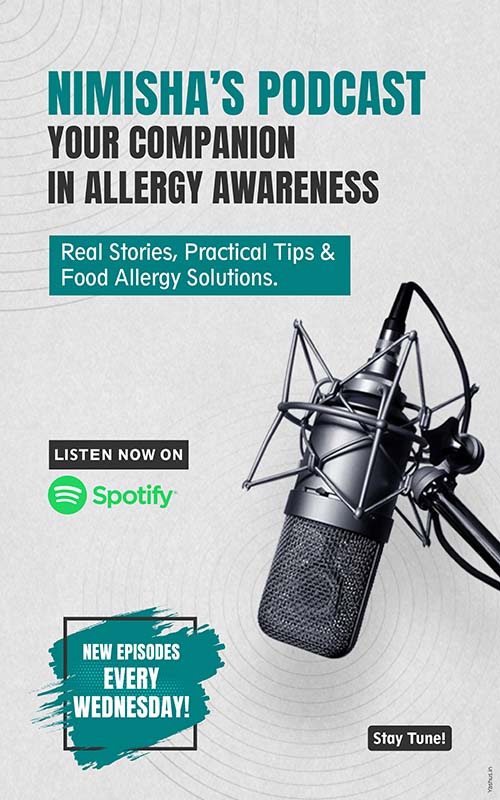Navigating Food Allergies in Middle School: Building Independence While Staying Safe
BlogsApril 29, 2025

The transition to middle school is an exciting time, filled with new experiences like making friends, attending school events, exploring cafeteria choices, and even going on school trips. However, for children with food allergies in middle school, this phase requires extra attention and preparation. As kids gain more independence, they must also learn to manage their food allergies with confidence and care.
Navigating food allergies in middle school involves much more than just avoiding certain foods. It’s about developing the skills to advocate for their safety, make informed food choices, and handle social situations with ease. With the right tools, support, and confidence, students can enjoy all the milestones of middle school while staying safe from allergens.
1. Understanding the Middle School Environment
As children transition into middle school, they encounter new routines and settings that can make managing food allergies in schools more challenging. With multiple teachers, different classrooms, and less direct supervision during lunch, it’s essential for students to be proactive in maintaining their allergy safety.
In addition to navigating the academic environment, middle school brings more social situations involving food, such as birthdays, school clubs, sports events, and school dances. These situations require careful planning and attention, especially when managing food allergies in the classroom and at school events. Students must be equipped with the knowledge and confidence to handle these social scenarios without compromising their safety.
2. Building Allergy Awareness and Confidence
When helping students manage food allergies at school, start by ensuring they understand their allergies, symptoms, and how to use their epinephrine auto-injector (e.g., EpiPen).
Use role-play scenarios to practice speaking up in the cafeteria, asking about ingredients, or politely declining food. This is part of a toolkit for food allergies in the classroom, equipping them with strategies for safety and independence.
Empower your child by fostering confidence—knowing how to handle food allergy situations builds independence and peace of mind.
3. Working with the School
504 Allergy Plan or Individual Health Plan: One of the key components in helping students manage food allergies at school is creating a formalized plan, such as a 504 allergy plan or an Individual Health Plan (IHP). These plans outline essential accommodations, like allergy-safe lunch tables and no-food classrooms, and ensure that staff are trained to recognize and respond to allergic reactions appropriately. A clear, well-communicated allergy plan helps students stay safe by setting specific protocols in place.
Communication with Teachers and Staff: Ensuring all school personnel are aware of the student's allergies and action plan is crucial. Teachers and staff should be informed about potential allergens and emergency procedures, which helps foster a safer environment for the student. A toolkit for food allergies in the classroom can be a helpful resource. It includes important details such as emergency contacts, a list of allergy-friendly snacks, and instructions on how to handle allergy incidents quickly and effectively.
Involve the School Nurse: The school nurse plays a vital role in helping students manage food allergies at school, especially in terms of administering emergency medication, such as an epinephrine auto-injector. By working closely with the nurse, schools ensure that the proper steps are taken during allergic reactions, which is critical for maintaining a safe school environment.
4. Navigating Social Situations
Friends as Allies: It's important to teach your child how to rely on their close friends for support during food-related situations. Encourage them to explain their food allergies and how friends can help in an emergency. Having trusted allies who understand the importance of avoiding allergens can make a big difference.
Handling Peer Pressure: Middle school is often filled with situations where kids face peer pressure, such as being offered a snack or treated to a “just one bite” scenario. Equip your child with the confidence to respond assertively by encouraging them to politely decline foods that may not be safe. Emphasize that they can always stick to their allergen-free snacks and allergy-friendly snacks to stay safe while socializing.
Safe Snacks Strategy: Encourage your child to always have a supply of allergen-free snacks on hand for unexpected events like school parties or friend gatherings. Pack allergy-friendly snacks in their bag or lunchbox, so they can easily avoid any unsafe foods. You can also help them discover creative and tasty allergen-free meals that are both safe and satisfying for every occasion.
5. Teaching Self-Advocacy
Encouraging kids with food allergies to advocate for themselves is key to ensuring their safety in middle school. Here are a few middle school food allergy tips:
-
Speaking up: Teach them to talk to teachers and lunch staff about their allergies confidently.
-
Recognizing symptoms: Help them spot early signs of a reaction so they can act quickly.
-
Epinephrine readiness: Make sure carrying and using their epinephrine auto-injector feels like second nature to ensure food allergy safety for kids.
6. Involving Parents, Without Hovering
As kids with food allergies in middle school start gaining more independence, it’s important for parents to step back from managing every detail and transition into a coaching role. While parents should always be there for support, encouraging self-reliance is key. Instead of taking control, try asking, "What would you do if...?" This allows kids to think for themselves and prepare for different scenarios while still knowing they can rely on you for guidance.
Conclusion
Middle school is a crucial time for kids to gain independence, especially when navigating food allergies in middle school. With the right tools and support, children can confidently manage their allergies and participate in school activities. Managing food allergies in schools ensures their safety and empowers them to thrive, enjoy their experiences, and reach milestones alongside their peers.
Learn more about Food Allergy Testing: What It Is, How It Works, and Why It Matters!
FAQ
-
Before your child enters middle school, it's crucial to teach them about their specific food allergies, how to recognize symptoms of an allergic reaction, and how to use their epinephrine auto-injector. They should also understand the importance of speaki

-
Encourage your child to practice speaking up in various school situations. This includes asking about ingredients in the cafeteria, explaining their allergies to teachers and friends, and politely declining food that might contain allergens. Confidence in

-
A 504 Allergy Plan is a formal document that outlines necessary accommodations to keep students with food allergies safe at school. It can include allergen-free lunch tables, designated no-food classrooms, and staff training on how to handle allergic reac

-
Encourage your child to always carry allergen-free snacks and educate their friends about their allergies so they can provide support in case of an emergency. Teach them to respond assertively to peer pressure and to politely refuse food that might be uns

-
The school nurse is a key resource for students with food allergies. They are responsible for administering emergency medication like epinephrine, managing allergy-related incidents, and ensuring the school follows the child's action plan. Having a strong













